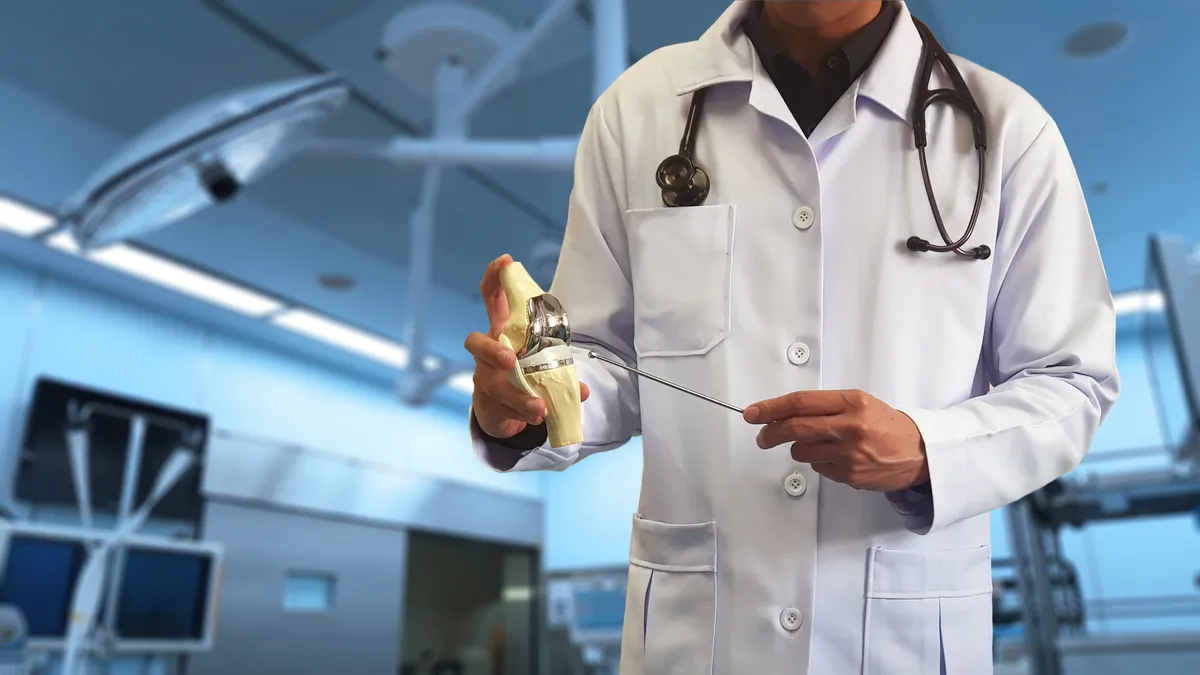Medical device companies are poised to weather an economic slowdown even as they continue to face hurdles linked to the pandemic such as persistent supply chain woes and staff shortages, analysts say.
While device makers aren’t completely immune to potential recessionary pressures, the industry should be fairly resilient to a deepening downturn, according to Shagun Singh, an RBC Capital Markets analyst.
“I think there are a lot of puts and takes by company to consider,” Singh said. “But there's definitely a lot of opportunity given that there is the defensive element in healthcare and medtech.”
While economists and politicians debate whether the U.S. has fallen into a recession, indicators suggest the economy is cooling after two straight quarters of declining GDP. Meanwhile, surging inflation and interest rates also are contributing to a slowdown as consumer spending wanes.
Those economic factors may curb consumer spending on devices and result in a drop in nonemergency care, similar to what transpired in 2020 amid the COVID-19 pandemic, analysts say.
At the same time, the healthcare environment is considered more insulated — especially since 2008 and 2009 — with more people having insurance coverage under the Affordable Care Act (ACA) and stronger safety-net programs like Medicaid expansion.
“I wouldn't expect things to be as severe, let's hope this time around. In terms of the procedure volumes, in terms of people losing their jobs, in terms of capital spending — I think it was all worse [during the Great Recession],” Needham Analyst Mike Matson said. “I do think we could see those similar things happen. It just may not be as quite as severe as it was back then.”
Any impact will be dependent on the market and company, RBC’s Singh said. Companies tied to more emergent procedures such as cardiac surgeries may be more resilient in a recessionary environment, whereas businesses with consumer-related products and procedures considered to be deferrable like orthopedics will be more vulnerable.
Watching procedure volumes
Singh called out Edwards Lifesciences, which specializes in cardiac surgeries, as a company that could be more resilient to the effects of a recession because its procedures are considered more necessary.
While the company has seen a slowdown during the pandemic, the declines were mostly linked to hospitals limiting procedures at their facilities to stop the spread of the virus and, more recently, healthcare staffing shortages.
Edwards lowered its 2022 sales forecast in July because of staffing shortages and foreign-exchange pressures.
Companies that are more vulnerable to an economic decline are Stryker and Zimmer Biomet, Singh added, as hip and knee replacement procedures are considered to be more deferrable, albeit necessary at some point. The analyst added that hospital spending also may dry up during a recession, leaving higher-cost products like robotic systems more vulnerable.
In the latest round of earnings calls, tighter hospital budgets were noted by Intuitive Surgical, limiting placements of its soft-tissue robotic system, while Stryker and Zimmer didn’t report a similar slowdown for their orthopedic systems.
Vijay Kumar, an analyst at Evercore ISI, said that while procedures may take a hit if unemployment rates rise, generally there wouldn’t be much of an impact on volumes. A curb in hospital spending might be more risk of a risk for device makers.
Margaret Kaczor, a William Blair analyst, wrote in an emailed statement that even if the orthopedic space faces a short-term slowdown of procedures, “those typically are not bad, and then it just queues up more cases for later.”
A factor for more stable procedure volumes could be the effects of the ACA. According to the Department of Health and Human Services, a record of more than 35 million people had insurance under the ACA in early 2022, and 28.7 million people were uninsured in the fourth quarter of 2021, compared with 48.2 million in 2010.
Furthermore, Medicaid expansion, which opens up eligibility for the program, is in 39 states, including Washington, D.C., providing a broader safety net for individuals and families that may lose employer-sponsored coverage.
“I think people fall back to ‘08/’09 because that's the most recent data point we have, and that sort of serves as a low watermark, right, in terms of how bad can things get,” Evercore’s Kumar said. “In general, I think this time around, there will be some impact but it should be slightly better than 2009.”
Along with more insurance coverage, different sales mixes and mergers and acquisitions have changed the marketplace, according to RBC’s Singh. The COVID-19 dip and the Great Recession can be used for reference, but there are eight or nine different points that need to be considered, the analyst added.
“We need to put the mosaic together,” she said, adding that Boston Scientific is an example of a company that has been hurt by procedure shutdowns throughout the pandemic, but “in an economic recession, they do not expect major swings in medical device utilization.”
Kaczor made a similar point, writing that “the financial crisis was a beast unto itself” and companies have a better body of evidence for the benefits of using their devices.
“As the stress on the providers increased as a result of the pandemic and likely in a potential recession, the medical device companies are increasingly stepping in with resources to offset some of those impacts on those providers,” Kaczor said. “This is part of the ecosystem expansion that [medtech] is undergoing.”
Pressure on consumer spending
A slowdown in consumer spending amid a recession is a concern for the medtech industry, and Singh specifically called out the diabetes technology space. While devices like continuous glucose monitors and insulin pumps are necessary for patients to manage their diabetes, they may not rush to buy the newest model or switch to the devices for the first time.
Tandem Diabetes Care, an insulin pump maker, was the first in the space to directly attribute a slowdown in sales to recession fears. CEO John Sheridan said on an Aug. 3 earnings call that data suggest that the threat of a recession and inflation was impacting new customers' decision to purchase its pumps beginning in the second quarter.
The company lowered its 2022 sales forecast last month by a range of $15 million to $20 million as a result.
Still, the insulin pump space is an example of the variance of companies’ forecasts for the second half of the year. Insulet, Tandem’s main rival, increased its revenue-growth forecasts and scaled up the launch of its latest pump.
Mick Farrell, ResMed’s CEO, has an optimistic outlook for the potential effects of a recession. Farrell said in an interview that while consumers may limit spending on products like Teslas or iPhones, medical devices are more necessary for patients.
“What we see is yes, huge slowdowns in consumer-driven spending. But the slowdown in medical — there may be one, but it's much more modest,” Farrell said. “We grew through the [Global Financial Crisis.] I have no question we will grow through this slowdown/recession in every country we're in.”
While there are still macroeconomic pressures facing medical device companies, RBC analysts wrote in an Aug. 7 note that they are now more confident in the procedure volume stability than when second quarter calls began.
Medtech executives are optimistic their companies can withstand an economic downturn as their businesses are more resilient than during the prior recession because of broader health coverage and a prolonged slowdown isn’t expected, according to the RBC report.
Singh said that companies likely won’t radically alter strategies, such as increasing diversification to expand revenue streams, if there is a recession.
“I think end markets are what they are. The fundamentals haven't shifted,” Singh said. “I don't see any change in the long-term strategy.”

















